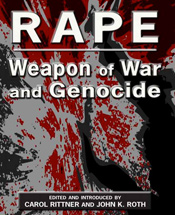 John K. Roth, the Edward J. Sexton Professor Emeritus of Philosophy and founding director of the Center for the Study of the Holocaust, Genocide, and Human Rights (now known as CMC's Center for Human Rights Leadership), has just published, Rape: Weapon of War and Genocide (Paragon House, September 2012). Admittedly a "grim topic," says Roth, the book is already surrounded by praise for its courageous content, gathered by writers and experts in the field of genocide studies and gender issues, as well as through the undeniably moving and horrific accounts shared by the survivorswomen and girlsof genocidal rape.
John K. Roth, the Edward J. Sexton Professor Emeritus of Philosophy and founding director of the Center for the Study of the Holocaust, Genocide, and Human Rights (now known as CMC's Center for Human Rights Leadership), has just published, Rape: Weapon of War and Genocide (Paragon House, September 2012). Admittedly a "grim topic," says Roth, the book is already surrounded by praise for its courageous content, gathered by writers and experts in the field of genocide studies and gender issues, as well as through the undeniably moving and horrific accounts shared by the survivorswomen and girlsof genocidal rape.
"Courage and fortitude will be needed to cope with the darkness" contained in the book's 300-plus pages, editors Roth and Carol Ritter note in the introduction, "but the hope is that the effort will be worthwhile because it will inspire solidarity with women," such as the survivors profiled.
The book focuses on violent armed conflictswars between or within nationsthat have been or continue to be genocidal. It includes key documents and discussion questions, and concentrates on diverse historic and contemporary atrocities to focus the challenges to male behavior, international law, and political action that arise from the agony of rape used as a weapon of war and genocide.
Adam Jones, executive director, Gendercide Watch, and author of Genocide: A Comprehensive Introduction, calls it "One of the most nuanced, illuminating, and grimly engaging volumes on rape and mass violence yet published."
"This book is of urgent importance for anyone who cares about the ravages of sexual violence and war," writes Doris L. Bergen, Chancellor Rose and Ray Wolfe Professor of Holocaust Studies at the University of Toronto. "Experts in law, history, philosoophy, and women's studies join therapists and activists to present the issues and analyze key documents, many of them accounts from victims of rape, from the Holocaust, Rwanda, Bosnia-Herzegovina, the Democratic Republic of Congo, and elsewhere. Relentless and unflinching, those accounts speak of despair and hope, resilience, pain, shame, and loss."
Right in the first pages, for example, is the introduction to Jeanette Uwimana, whose young daughter and husband were murdered when the 1994 death of Rwanda's president triggered attacks against the country's Tutsi minority by extremists in the Hutu majority. The Hutu-led genocide killed an estimated 800,000 to 1 million Tutsis and moderate Hutus over 100 days. Uwimana, survived, along with her young son, only to be raped repeatedly by gangs of Hutu men and infected with HIV-AIDS.
Her story, and the many stories of other survivors, are recounted "with the hopes that people who read about [them] will learn what happened in Rwanda and be moved to rebuild hopes and dreams," Roth and Ritter say, "when such atrocities take place, but also to prevent and resist such disasters before they do their worst.
"Rape continues to be a weapon of war and genocide," they say, "but the book seeks to resist that reality. Depending on how its readers respond, the book, we hope, may spread its message farther than any one of its authors could do alone."
New Book by Professor Emeritus John Roth Explores Grim Topic of Rape as Weapon of War and Genocide
Topics
Contact
Office of Strategic Communications & Marketing
400 N. Claremont Blvd.
Claremont, CA 91711
Phone: (909) 621-8099
Email: communications@cmc.edu
Media inquiries: CMC Media
Email: media@cmc.edu
